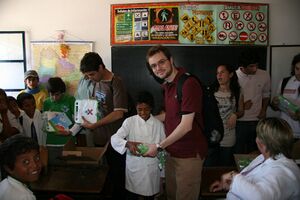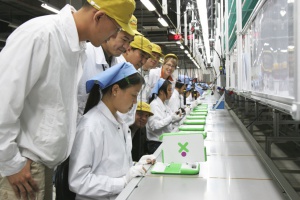このページは、OLPCチームによってチェックされています。
- This is an on-going translation
OLPC Wikiへようこそ。これはOne Laptop per Childに関連するプロジェクトとコミュニティの共同作業の記録です。現在、9,909のページがあり、約二千個のファイルと約二千人の登録者がいます。ぜひ、参加してアイデアを共有しましょう。
wiki以外のサイト(laptop.org)もあります。
Welcome to the OLPC Wiki, home to collaborative notes about the One Laptop per Child project and related projects and communities. We currently have 9,909 pages and roughly two-thousand files and two-thousand registered contributors; please join us and share your ideas.
There is also a non-wiki
laptop.org.
新着情報
毎週の更新情報はこちらから。
- OLPCはまさにスタート地点に立ったに過ぎません. ウルグアイでOLPCのXOの最初の量産モデルの配布が始まりました! (詳しくはIvan Krstić's blogをご覧下さい。) 次の配布先: ペルー (注文数は260,000です。)
過去のニュースはこちらから。
{{{1}}}
One Laptop per Child(OLPC)について
- 「これは教育のプロジェクトだ。ラップトップのプロジェクトではない。」
- — ニコラス・ネグロポンテ
ここはOne Laptop per Child(一人の子供に一台のラップトップ; OLPC)のWikiです。この非営利団体の目的は、低価格のノートパソコン— $100 ラップトップ—と世界の子供たちを教育する方法についての革命的な技術を開発することです。私たちのゴールは世界中の子供たちに探求や経験、自己表現の機会を提供することです。
なぜ発展途上国の子供たちにラップトップが必要なのでしょうか。
ラップトップは、世界に開かれた窓であり、考えるための道具です。それらは、独立した相互作用と探索を通じて、すべての子供が学ぶことを学ぶためのすばらしい方法です。
OLPCは5つの基本原則を支持します。(1)子供の所有権 (2)低年齢 (3)浸透 (4)接続性 (5)フリーかつオープンソース。
さらに多くのラップトップ とOLPCの学習に対する考え方があります。
- It's an education project, not a laptop project.
- — Nicholas Negroponte
This is the wiki for the One Laptop per Child association. The mission of this non-profit association is to develop a low-cost laptop—the "$100 Laptop"—a technology that could revolutionize how we educate the world's children. Our goal is to provide children around the world with new opportunities to explore, experiment, and express themselves.
Why do children in developing nations need laptops? Laptops are both a window and a tool: a window into the world and a tool with which to think. They are a wonderful way for all children to learn learning through independent interaction and exploration.
OLPC espouses five core principles: (1) child ownership; (2) low ages; (3) saturation; (4) connection; and (5) free and open source.
More on the Laptop and OLPC's vision for learning.
もっと知りたい? 参加したい?
このWikiを探検するに当たって、最初にOne Laptop per Childを読むと良いでしょう。ここにはプロジェクトの概要があります。また、よくある質問と答え(FAQ)の一覧、質問の場所、OLPCへの関与と参加、現在の求人もあります。例えば、私たちは翻訳と同梱コンテンツの準備のために臨時の従業員を雇うこともあります。ハードウェア、ソフトウェア、教育用コンテンツ、開発者プログラムについての多くのページ、そして独立したソフトウェア開発Wikiがあります。Sugarは新しいインタフェースで、そのインタフェースガイドラインがあります。配布と国ごとの問題についての議論をするためのページもあります。詳細な目次もあります。
もし、ラップトップを試してみたいなら、お使いのPCでXOをエミュレートすることは難しくありません。もっとよいことに、Give 1 Get 1で実物を取引して、私たちを助けることもできます。最新ビルドは常に ここにあります。最新の安定版は常に ここです。(B1とB2マシンは406.15を、それより新しいマシン(B3, B4, Cマシン)はShip.2(650)を使ってください)
また、OLPCは慎重にフルタイムの社員を募集しています。
A good place to start is the One Laptop per Child page, which gives an overview of the project. There is a list of frequently asked questions (FAQ); a place to ask a question; places to get involved, participate and current job openings; We can use some extra help translating and preparing content bundles in general, for example. There are numerous pages on hardware, software, content, and the developers program—and a separate wiki for software development. Sugar is a novel interface with its own interface guidelines. There are also discussion pages on issues of deployment and country-specific discussions. An extended table of contents is also available.
If you want to try out the laptop, it is not very difficult to emulate the XO on your PC. Better yet: you can support us by getting the real deal with Give 1 Get 1. The latest build is always available here. The latest stable build is always available here. (Please use 406.15 for B1 and B2 machines; please use Ship.2 (650) for more recent machines, e.g., B3, B4, and C machines.)
OLPC is also carefully filling some full-time positions.
このWikiについて
このWikiの目的はプロジェクトについての情報を共有し、アイデアとフィードバックを生み出すことです。記事と議論は、技術的なものから認識論に至るまで多岐にわたります。すべてのページへのコメントを歓迎します(それぞれのページの「ノート」タブを使ってください)。記事自体の編集は事実のみにとどめ、意見は控えてください。作業したものに署名して、引用とリンクを自由に使用できるようにすることを勧めます(コメントの署名として、アカウントを作成して使ってください)。{{OLPC}}テンプレートを含むページはOLPCチームによって保守されており、現在のプロジェクトの状況を代表していることに注意してください。一般の人によって保守される他のページはそのことを念頭において読む必要があります。
The purpose of this wiki is to both share information about the project and to solicit ideas and feedback. The articles and discussion vary from technical to epistemological. We invite comments on every page (please use the "discussion" tab at the top of each page). Please restrict edits to the article pages themselves to facts, not opinions. You are encouraged to sign your work and to make liberal use of citations and links. (Please make an account and please use ~~~~ as a signature for your comments.) Please note that pages that include the {{OLPC}} template—such as this one—are maintained by the OLPC team and are generally representative of the current state of the project. Other pages—created and maintained by the public—should be read with that in mind.



